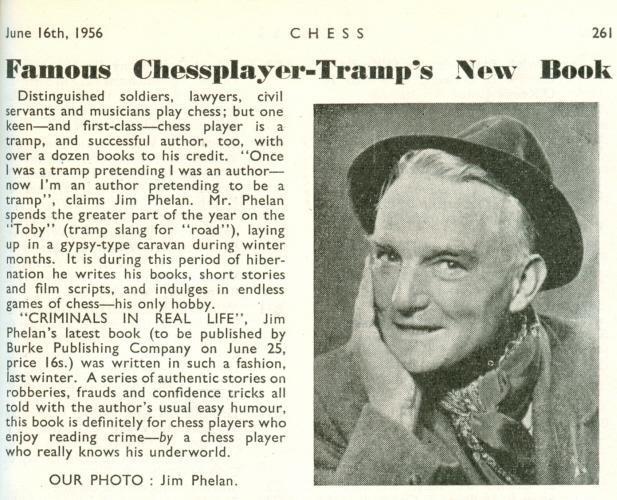
Edward Winter
The following item about Jim Phelan appeared on page 261 of CHESS, 16 June 1956:

Below is an abridgement of an episode related on pages 123-130 of Criminals in Real Life (London, 1956), whose dust-jacket describes Phelan as ‘blacksmith, journalist, ship’s fireman, film script writer, barman, broadcaster, navvy, actor, gun-runner, convict and tramp’.
‘Bill Brunty [also known as Brummy Braine – a fellow inmate of Phelan’s at Parkhurst Prison] was one of the chief jail-breakers of his day, if not the chief. ... He used to say, in joke, that his name was really Brontë, and that the famous literary sisters were his grandmother – all three of them. ...
In the intervals of fighting with the warders, Billy turned out some beautiful examples of handicraft work. (All illegal, of course; he was not allowed any tools or materials.) He made telescopes, microscopes, bone chessmen, little carved figures made from broken tooth-brushes, rings and bracelets of bone and wire; he even made fountain-pens. ...
He made me a very useful telescope, for six inches of pigtail tobacco, and he gave me a kaleidoscope “for nothing”, only coming to borrow three inches of pigtail a few days later. Then one day he sent me over a chess-piece, a white queen, carved from bone.
It was a lovely piece, and I told Billy so when I asked him the price. He glowed at the praise, said the price didn’t matter for the moment. Then I asked him how long the piece had taken him to carve.
“Six months you’d give me, eh?”, he inquired. Knowing the difficulties under which he worked, I nodded agreement. Then, since there are 32 pieces in a chess-set, and since all jail-humour is pretty grim, I made the correct wisecrack.
“In that case, Brummy”, I grinned, “all you need is three or four more laggings, and you’ll have the full set.” Brummy seemed to have been waiting for me to say something like that.
“I gottem now”, he asserted. “Got the whole set finished.” Promptly I offered him four ounces of pigtail for the chess-pieces.’
.The offer was refused, Phelan being requested instead to make him a key in the prison workshop. The exchange was made a few days later.
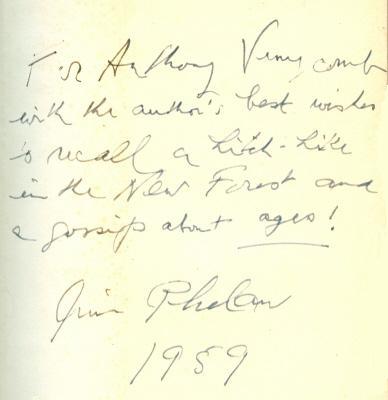
Our collection contains several books inscribed by Phelan, including Criminals in Real Life (above). The dust-jacket of our copy also features his handwritten ‘address’: ‘The Post Office, Burley, Ringwood’.
Phelan was a prolific author, and we plan to revert to his books in a future item. As regards his vagabondage, in 1964 he presented a BBC television programme, part of which is available on-line. [Addition on 27 January 2014: link no longer working.](5062)
Roland Kensdale (Aberdeen, Scotland) mentions that Jim Phelan was featured in the chapter ‘Chess in Captivity’ in Chess Pieces by Norman Knight (London, 1949). Our correspondent comments:
‘In his Foreword Sir George Thomas recalled (pages vii-viii) a simultaneous display which he gave in Parkhurst Prison while Phelan was an inmate:
“It has saddened me to learn from the section ‘Chess in Captivity’ that chess contact between the inmates of Parkhurst and the outside world has been discontinued. A simultaneous display I gave there, in the days of the author of Walls Have Mouths, is among the most prized of my chess memories. It was easy to sense what that short break meant to the prisoners. Never before or since have I had opponents so completely absorbed in the game, or been so conscious myself of a bond uniting us. When play was over, Jim Phelan – who appears in Walls Have Mouths – made the neatest speech of thanks I have ever heard; and another of the players gave me a sachet, made out of a piece of an old shirt and filled with lavender. My own enjoyment was marred only by the moment of departure; going into the fresh evening air and knowing that behind me keys were turning. Wholeheartedly I endorse Mr Knight’s plea for the encouragement of the game in every penal institution in the country.”
It is on pages 201-207 that the chess club at Parkhurst Prison is mentioned in an excerpt from the book Walls Have Mouths by Wilfred Macartney (London, 1936).
On pages 209-210 some of Phelan’s writing is quoted from CHESS, October 1943 (page 13). This includes a poem about play at Parkhurst.’
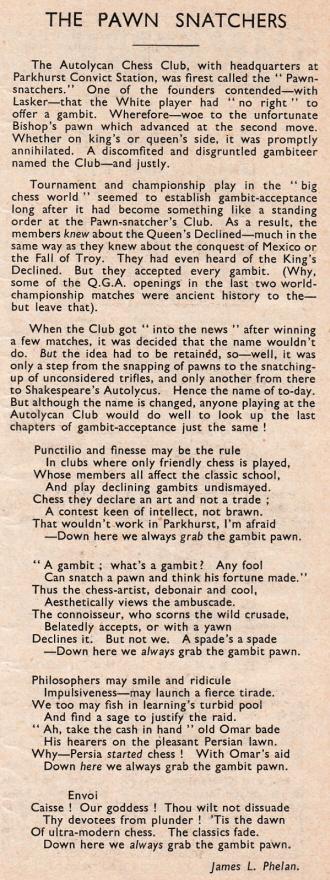
The passage below from page 259 of The Name’s Phelan by Jim Phelan (London, 1948) concerns his time in Dorset after the First World War:
‘Much of the chess I played, in the intervals of wasting my time around the tank park, was with a curious, overstrung, distant person who might have been Irish but had never been in Ireland. Acting-Lance-Corporal Shaw was on (some of) his correspondence. I never had time to find out if he was really Lawrence of Arabia. Everyone in camp said so, as a dead secret reminiscent of the Dublin Sporting Echo. Except those who said he was the rightful King of England, with similar theories.’
The autobiography’s dedication page comprised two words: ‘For myself’.
(5085)
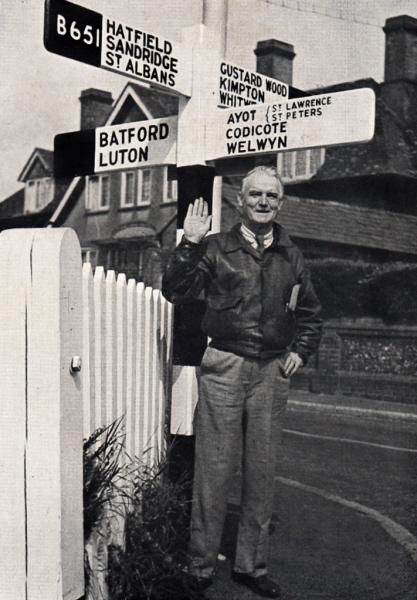
The above photograph of Jim Phelan is the frontispiece in his book We Follow the Roads (London, 1949). The next shot comes from the first page of a 1963 booklet by him, Vagabond:
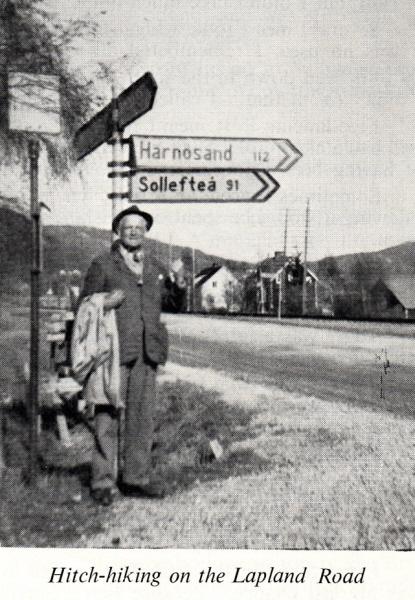
From the same booklet:
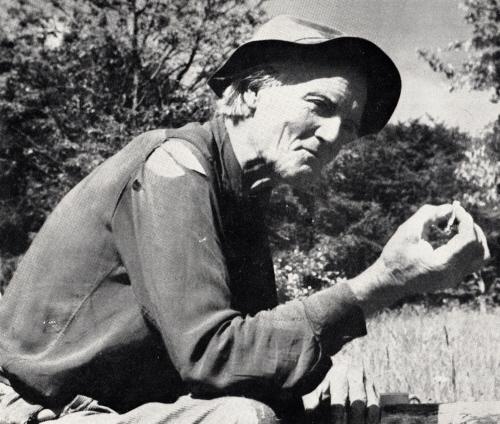
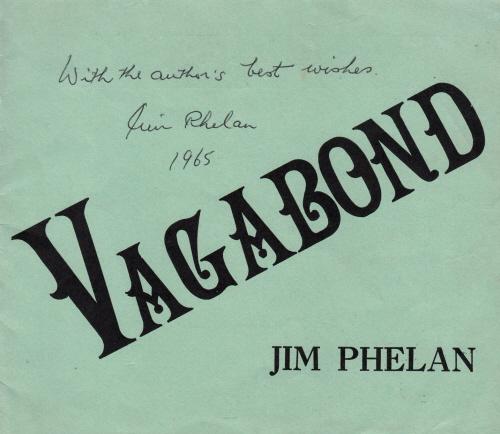
Sir George Thomas’s visit to Parkhurst Prison was reported on pages 543-544 of the December 1935 BCM:
‘Sir George Thomas has been giving many simultaneous displays on behalf of the Nottingham Chess Congress, 1936. ... One which gave a great deal of pleasure was at H.M. Prison, Parkhurst, Isle of Wight. He played 16 members of the prison chess club, including the chaplain, who is the president. Sir George won them all, although several games were well contested. The chaplain proposed a vote of thanks, and this was very ably seconded by one of the convicts, who hoped Sir George would realize what pleasure it gave them to have a game with such a renowned chessplayer.’
The exhibition was also mentioned on page 7 of the Daily Mail, 4 November 1935:
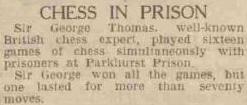
As will be seen below, the lengthy game was against Phelan.
A further newspaper report (Nottingham Evening Post, 28 April 1937, page 4) gave general information about chess in Parkhurst Prison:
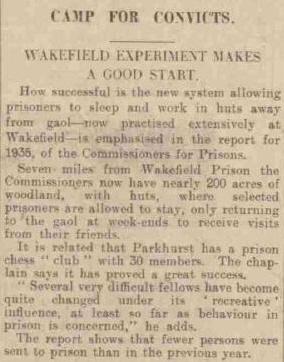
Below is the obituary of C.F. Chapman on page 185 of the June 1949 BCM:
‘C.F. Chapman died at Bournemouth on 23 April at the age of 84. He will be remembered as a Past President of Dorset C.A. and Hampshire Chess Association, and a Vice-President of Sussex. At different times he held the championship of the Brighton, Bournemouth, Parkstone, Eastbourne, Chichester and Isle of Wight clubs; but perhaps he will be best remembered for his work in introducing chess to Parkhurst Prison during his sojourn in the Isle of Wight. This was well written up in the book on prison life Walls Have Ears – F.L.T.’
As noted above, the book was entitled Walls Have Mouths.
The book by Phelan with the most references to chess is Jail Journey (London, 1940), e.g. on pages 75, 120, 140, 160, 188, 285-286, 298, 306-307, 331, 333-336, 349-350, 359-364, 369, 374-376, 381. On pages 374-376 he discussed Sir George Thomas’s visit to Parkhurst Prison in 1935:
‘I still went to the Chess Club on Saturdays, but I was not the Club champion now, not least for a time. Only once, for a week or so, I recaptured some of the old fierce energy, when Sir George Thomas came down to play against us. Thomas was in the champion class, has held the British Championship, would never insult a player by giving him the slightest chance or patronizing him in any way. To play against Thomas was going to be an intellectual and emotional treat for most of us. Not least for me. After all, the Club was my baby, born after years and not months of travail in the strangest home in the world. Thomas going to be a fine god-parent.
It is laughable now, but I was furious at the time; things nearly went wrong. There was no need to school my players. They knew chess etiquette, and grave punctilio, as well as any men in Europe. They would not let the jail team down. Yet Thomas was nearly embarrassed after all.
It will have been guessed that not every jail-employee saw eye-to-eye with Clayton about “letting people play chess”. In the early days of the Club there had been many ludicrous clashes with groove-minded officials who could not understand that times had changed, that it was no longer “days gone by”. (“Lee don f’r chess. ’Alt. C’mmence chess.” As if arrogant people like Macartney or myself – with official backing – could tolerate that kind of nonsense.) Lately things had been moving more smoothly; no-one tried to be obstructive; Scott had continued, and backed, the Chess Club, exactly as Clayton had done.
Thomas came. He played all of us. Time passed. The session was longer by far than most similar plays “outside”; we were rather tough nuts to crack. The hour for finishing had gone by. We ought to be in our cells. We played on. At the first board, I was organizer, secretary, semi-grass watcher that everything went well, buffer between Thomas and intruding screws, and I was also playing Sir George. Our game had gone 70 moves. I was going to draw. I knew I was going to draw. Now this was something to be conceited about.
And a voice said barkingly: “Pack up. Lee don outside.”
I did not wish to kill the man, did not even, I insist, desire to kick him again and again in the mouth! Such is the superhuman self-control of the skilled chess-thinker. I advanced from my place, hoping Thomas would not have understood. The boys were looking at me anxiously. On the command, they should have filed silently outside, leaving Thomas in an empty room with some useless chess-men. No-one moved.
Blakely from Ryde was there, a civilian chessplayer who had a semi-official status. Blakely backed me up, and we wafted the zealot outside, stilling his murmurs that it was “past time now. Bell’s gone”. He wasn’t even in charge either! Just a zealous exponent of the code, demonstrating that courtesy, decency, sensitiveness or consideration for the feelings of others cannot possibly exist in an illiterate degraded convict! Or something like that. Presently the man in charge appeared, a little later the Chief showed up, and all was quiet again. I went back to my board, made my move, lost my game. Curse that groove-brained code-mumbler!
After that match, soon and swiftly, I dropped quietly off into a routine of nothingness.’
Harry Golombek reviewed Jail Journey on page 192 of the June 1940 BCM:
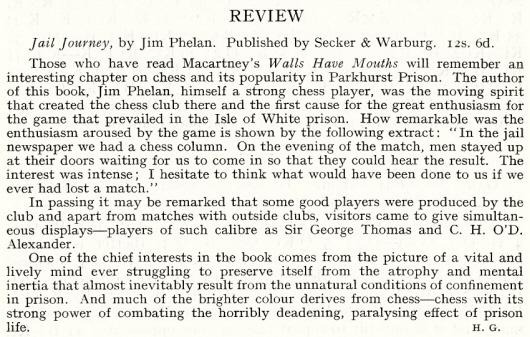
See too Sir George Thomas.
An extract (‘Chess in Parkhurst’) from Walls Have Mouths by W. Macartney also appears on pages 25-27 of The Chess Player’s Bedside Book by R. Bott and S. Morrison (London, 1966).
There are a few references to chess in Tramp at Anchor by Jim Phelan (London, 1954), e.g. on pages 66, 71, 110 and page 219. The last of these concerns his stretch in Parkhurst Prison:
‘I was careful. At that time I was near to the master class as a chessplayer, and I played my whole life as a chess game. Nothing was left to chance. Nothing was risked if it could be calculated. Survival – survival was my law and my life, for I knew that if ever again I was taken inside the walls I would die swiftly.’
The back of the dust-jacket:
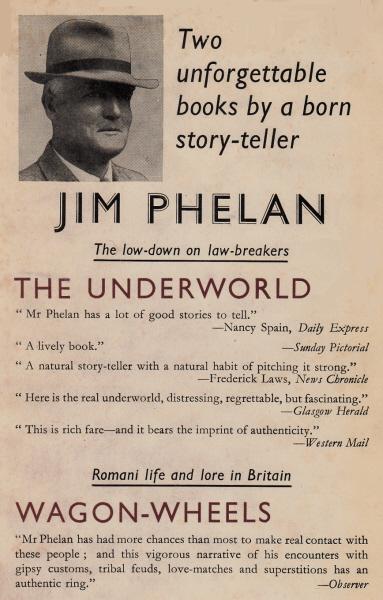
(8581)
To the Chess Notes main page.
To the Archives for other feature articles.
Copyright: Edward Winter. All rights reserved.